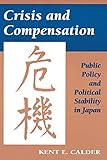Crisis and Compensation : Public Policy and Political Stability in Japan / Kent E. Calder.
Material type: TextPublisher: Princeton, NJ : Princeton University Press, [2022]Copyright date: ©1984Description: 1 online resource (584 p.)Content type:
TextPublisher: Princeton, NJ : Princeton University Press, [2022]Copyright date: ©1984Description: 1 online resource (584 p.)Content type: - 9780691229478
- HISTORY / Asia / Japan
- Agricultural policy
- Agriculture
- Asahi Shimbun
- Balance of trade
- Bank of Japan
- Big business
- Budget
- Bureaucrat
- Calculation
- Chairman
- Chamber of commerce
- Civil service
- Corporatism
- Currency
- Debt
- Developed country
- Developmental state
- Dodge Line
- Domestic policy
- Economic development
- Economic growth
- Economic planning
- Economics
- Economy of Japan
- Economy
- Electoral district
- Employment
- Exchange rate
- Failed state
- Financial institution
- Fiscal policy
- Foreign policy
- Funding
- General account
- General election
- Government budget balance
- Government of Japan
- Grassroots
- Home Ministry
- Income
- Industrial policy
- Industrial society
- Industrialisation
- Institution
- Insurance law
- Interdependence
- Japanese economic miracle
- Labor unrest
- Legislation
- Liberalization
- Lobbying
- Lower house
- Mass politics
- National Government (United Kingdom)
- National security
- Nationalization
- Nixon shock
- Occupation of Japan
- Pension
- Policy entrepreneur
- Policy
- Political culture
- Political economy
- Political history
- Political party
- Political science
- Political structure
- Politician
- Politics
- Postwar Japan
- Private sector
- Public policy
- Ratification
- Raw material
- Recession
- Regional policy
- Requirement
- Revaluation
- Shortage
- Small business
- Social Democratic Party (Japan)
- Subsidy
- Supply (economics)
- Supporter
- Tax
- Technocracy
- Telecommunication
- Trade union
- Treaty of Mutual Cooperation and Security between the United States and Japan
- Treaty
- Uncertainty
- Unemployment
- Upper house
- Urbanization
- Welfare
- West Germany
- Western Europe
- Workforce
- World War II
- World economy
- 320
- DS889
- online - DeGruyter
| Item type | Current library | Call number | URL | Status | Notes | Barcode | |
|---|---|---|---|---|---|---|---|
 eBook
eBook
|
Biblioteca "Angelicum" Pont. Univ. S.Tommaso d'Aquino Nuvola online | online - DeGruyter (Browse shelf(Opens below)) | Online access | Not for loan (Accesso limitato) | Accesso per gli utenti autorizzati / Access for authorized users | (dgr)9780691229478 |
Browsing Biblioteca "Angelicum" Pont. Univ. S.Tommaso d'Aquino shelves, Shelving location: Nuvola online Close shelf browser (Hides shelf browser)

|

|

|

|

|

|

|
||
| online - DeGruyter Haunted Museum : Longing, Travel, and the Art - Romance Tradition / | online - DeGruyter Corporate Governance Lessons from Transition Economy Reforms / | online - DeGruyter The Strictures of Inheritance : The Dutch Economy in the Nineteenth Century / | online - DeGruyter Crisis and Compensation : Public Policy and Political Stability in Japan / | online - DeGruyter Chinese Primer, Volumes 1-3 (GR) / | online - DeGruyter Finding the Words : The Education of James O. Freedman / | online - DeGruyter Cries For Democracy : Writings and Speeches from the Chinese Democracy Movement / |
Frontmatter -- Contents -- List of Illustrations -- List of Tables -- Preface -- A Note on Conventions -- Introduction -- 1 The Specter of Crisis -- 2 A Chronology of Crisis -- 3 The Technocratic Possibility -- 4 From Crisis to Compensation -- 5 Agricultural Policy: The Wax and Wane of Rural Bias -- 6 Regional Policy: Periodic Power to the Periphery -- 7 Small Business Policy: The Confluence of Industrial Policy and Welfare -- 8 Welfare Policy: Strategic Benevolence -- 9 Land Use Policy: Exclusive Circles of Compensation -- 10 The Residual: Defense -- 11 Explaining Patterns in Japanese Public Policy -- APPENDIX I: Major Innovations in Six Key Japanese Public Policy Sectors, 1945-1986a -- APPENDIX II Japanese House of Representatives General Election Results, 1946-1986a -- Bibliography -- Index
restricted access online access with authorization star
http://purl.org/coar/access_right/c_16ec
Why does Japan, with its efficiency-oriented technocracy, periodically adopt welfare-oriented, economically inefficient domestic policies? In answering this question Kent Calder shows that Japanese policymakers respond to threats to the ruling party's preeminence by extending income compensation, entitlements, and subsidies, with market-oriented retrenchment coming as crisis subsides. "Quite simply the most ambitious and strongly argued interpretation of a key dimension of Japanese political life to appear in English this decade."--David Williams, Japan Times "Historically dense and conceptually rich. [Forces] readers' attention to the domestic underpinnings of Japanese foreign policy."--Donald S. Zagoria, Foreign Affairs "Punctures the myth of Japan Inc. as a cool, rational monolith."--Kathleen Newland, Millennium "A bold reinterpretation of Japanese politics that will force us to rethink many of our current assumptions and will influence our research agenda."--Steven R. Reed, Journal of Japanese Studies
Mode of access: Internet via World Wide Web.
In English.
Description based on online resource; title from PDF title page (publisher's Web site, viewed 29. Jul 2022)


